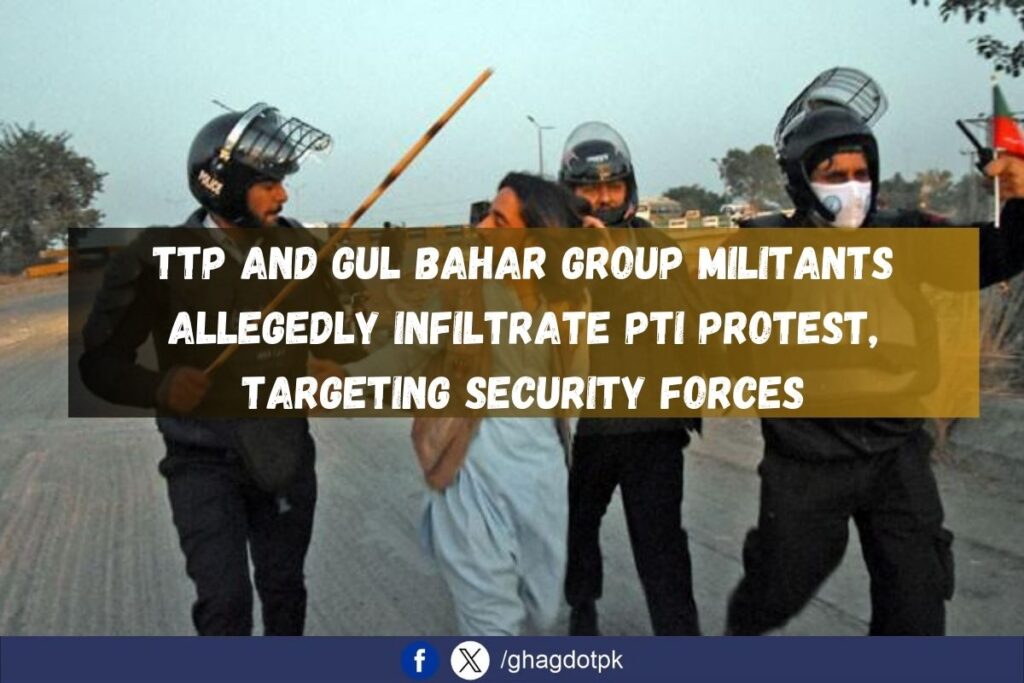Islamabad (Ghag Report):
In a disturbing turn of events, intelligence sources have revealed that militants from the Tehreek-i-Taliban Pakistan (TTP) and the Gul Bahar Group have reportedly infiltrated Pakistan Tehreek-e-Insaf’s (PTI) ongoing protests, with a specific agenda to target security personnel. These reports have raised serious concerns about the safety of law enforcement officers and the broader security situation in the country.
According to intelligence officials, the militant groups are using the cover of large-scale protests to launch attacks on security forces stationed in sensitive areas. The TTP, known for its long history of violence and attacks on Pakistani security forces, along with the Gul Bahar Group, a more localized militant faction, has been identified as part of the growing threat against law enforcement officers.
Covert Attacks on Security Forces
The primary aim of these militants, according to officials, appears to be a deliberate focus on killing or injuring police and military personnel who are tasked with controlling the crowds and maintaining order during the protests. In recent days, multiple incidents have occurred where security officers were ambushed or targeted with small arms fire, and authorities are now working to identify how deeply these groups have infiltrated the protest ranks.
Reports suggest that these groups have strategically aligned themselves with certain protest factions, capitalizing on the chaos to carry out coordinated attacks. The law enforcement agencies are already investigating whether these militant groups are receiving direct support from PTI’s protest leadership or whether they are operating independently under the cover of the unrest.
Growing Concerns Over National Security
The involvement of these terrorist factions in a political protest has led to heightened fears about the security of not only the demonstrators but also the general public. As protests intensify, the risk of escalating violence increases, particularly if the militants succeed in their objectives of destabilizing the situation further.
Sources indicate that both local and international intelligence agencies are monitoring the developments closely. The presence of such groups within the protests underscores the complexity of the current political landscape in Pakistan, where political activism has become dangerously intertwined with militant activity.
Government Responds with Increased Security Measures
In response to these threats, Pakistan’s Interior Minister, Mohsin Naqvi, has called for immediate reinforcements to safeguard key government buildings and ensure the protection of security forces. Military and paramilitary units have been deployed in sensitive areas, and additional surveillance is being conducted to track the movement of these militant elements.
The government has also issued stern warnings to protest organizers, urging them to distance themselves from these elements and ensure that their demonstrations remain peaceful. However, critics argue that the government’s failure to prevent the infiltration of such dangerous groups into the protest movement is a significant lapse in security and intelligence coordination.
Potential for Further Violence
As the situation continues to develop, there is widespread concern that the involvement of TTP and Gul Bahar militants could spark even more violent confrontations in the coming days. The Pakistani government is facing mounting pressure to not only address the political unrest caused by PTI’s protests but also to deal with the growing threat of terrorism and militant violence on the streets.
With the country’s political crisis showing no signs of abating, the situation remains volatile, and all eyes are on Pakistan’s leadership to manage both the protest movement and the security challenges posed by these militant groups. The unfolding events are being closely watched by international observers, who fear that the instability in Pakistan could have far-reaching consequences for regional security.






